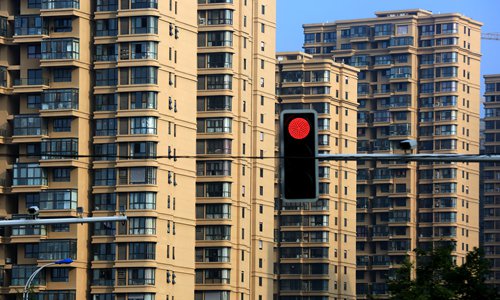SOURCE / MARKETS
Property market remains stable in China, flexible policy expected

This photo taken on Sunday shows real estate development projects in Huaian, East China's Jiangsu Province. Photo: VCG
China's housing markets in February remained basically stable amid the coronavirus outbreak. Experts noted the slowing growth was within expectation.
They forecast China's policy toward the real estate sector will be more flexible, as a stable housing market will offer key support for the country's economic growth.
The price of new houses in four first-tier cities in February remained flat over January, compared to the previous month's 0.4 percent increase, and the price in 31 second-tier cities edged up 0.1 percent month-on-month, 0.3 percentage points lower than January, read an online statement from China's National Bureau of Statistics (NBS).
The epidemic has had huge impact on economic growth, including growth in the real estate sector, Song Ding, a research fellow at the Shenzhen-based China Development Institute, told the Global Times on Monday.
It was inevitable that the turnover of houses would drop during the month, Song noted.
China has rolled out strict control measures since the outbreak began in late January, and real estate projects' sales offices have been shut down across the country. According to the NBS, commercial housing sales totaled 820.3 billion yuan ($117.13 billion) across January and February, down 35.9 percent.
China has unswervingly promoted a policy framework for the real estate sector as "houses are for living, not for speculation." Song noted that the basic tune of the policy would not change as the housing market has played a critical role for the stability of the economy.
And it is reasonable for governments to adopt more flexible measures with regard to the housing market, including both monetary and fiscal policies to keep the market from a drastic price drop, Song said.
The central bank has adopted a moderately eased monetary policy with declining loan prime rate (LPR) prospects, which could offer a boost for the real estate sector and uphold activity in the market, he noted.
For short-term development, Song forecast the market will see a rebound after April as the virus epidemic is increasingly being put under control. "The bounce back is certain, as long as imported infections and the rate of recovered patients becoming infected again is contained."

